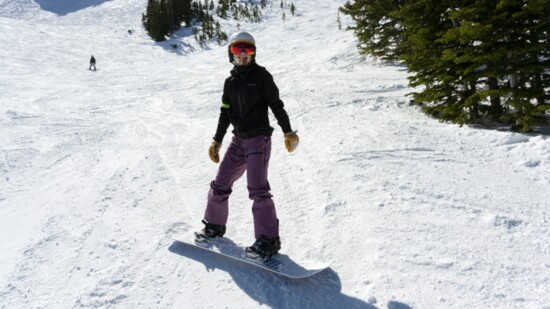“Smile! You’re on camera!”
All individuals approaching the tiny skate park outside of 225 East Mendenhall are greeted by this signage. Driving by or walking into Fresco across the creek, you can’t miss the bright mural on the one-story building adjacent to the concrete ramp. Snow or shine, groups of young skateboarders can be seen here throughout the year, skating and talking and generally occupying this special space between school and home.
This is the site of Big Sky Youth Empowerment, a local nonprofit and group mentorship program, serving the teens of Gallatin Valley. Combining mentorship with outdoor adventures for 7th to 12th graders who are facing life challenges, Big Sky Youth Empowerment (BYEP) states their mission as such: “BYEP creates a transformative community where vulnerable teenagers experience belonging, purpose, and well-being through group mentorship, adventure, and connection with the natural world.”
Founded by local therapist Pete MacFadyen in 2001, BYEP started out as a one-man operation in MacFadyen’s garage, with just 6 participants. “He was seeing a lot of teens in his counseling sessions and noticing that just one hour per week wasn’t really enough time,” explains Marie-Luise Klotz Tumolo, BYEP’s Marketing and Communications Manager. “He felt like if he took them outside and created that group mentorship system, the impact would be much bigger – his ability to help them would change drastically. So he gathered up the first group of teens and got to work.”
This intention of helping struggling teens with a combination of therapy and a connection to the outdoors has evolved into what BYEP is today. The programis divided into three 12-week seasons: Winter, Summer, and Fall, with 10 hours of programming each week. Once their application is accepted, teens are grouped by grade into programs (Traverse is 7th and 8th grade, Approach is 9th and 10th, and Crux is 11th and 12th) with peers, mentors, and Program Managers for weekday workshops, held 4p.m. to 7p.m. in groups of six to eight teens.
“The workshops have different components,” says Tumolo. “A really powerful one is the check-in, where they talk about the high of their week and the low of their week, just to kind of get a baseline of what’s going on in their life. Often hearing about what what’s going on in others’ lives helps to create this sense of connection that they’re not alone and they have each other to support each other through it. Over fifty percent of the teens that we serve struggle with some form of depression or suicidal ideation; it’s very common in Montana. So whatever problems they’re facing, BYEP is here to be an additional resource in their lives.”
The programs focus on building healthy relationships, independent decision-making, and interpersonal skills with topics like Group Forming, Building Connections, Commitment to Personal Growth, Cultivating Healthy Relationships, Building Trust and Rapport, Deepening Trust, Social Identity: Culture and influence, Self-Assessment and Exploration of Gifts. Examples of activities include woodworking, pasta-making, painting and other crafts – the talent and creativity of these groups can be seen in the program workshop rooms throughout the building; all surfaces are covered in an explosion of color and imagination.
Weekend adventures include skiing, snowboarding, hiking, rock-climbing, white-water rafting, gardening, paddle boarding and of course, skateboarding, for which helmets and waivers are mandatory. (Fun fact: MacFayden recruited some of his first teens by going to skate parks during school hours and seeing who was not in school.) Thanks to partnerships, federal and private grants, fundraising, private donations, events, and other means, BYEP is able to provide these activities and all the accompanying gear at no cost to the teens (the entire program is free, in fact—BYEP is scholarship and needs-based).
“It’s an ongoing need,” Tumolo says. “The teens in this time that we live in are facing new challenges, one being the rapid growth of social media and how it impacts their mental health. Our program is still so relevant and we really are situated within the context of our community. We couldn’t do this work without the help of so many partners, sponsors, and our amazing network. We’ve had incredible success over the past 23 years – we’ve served over 1,000 teens. However, the need is still great. Our work is not done.”
